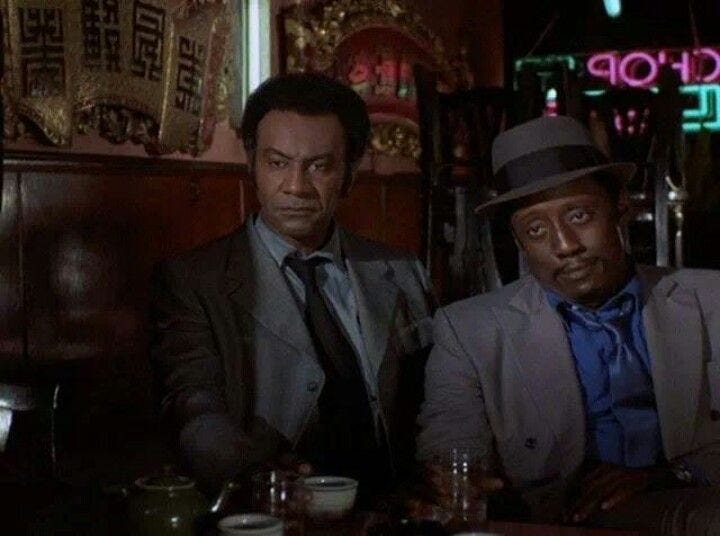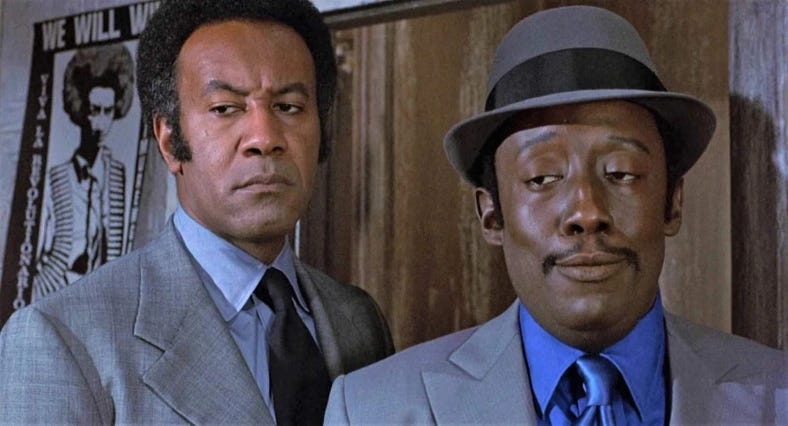Preorder The Last Exile and/or preorder A Lonesome Place for Murder
March 26th, a month from now, I’ll be at the Vancouver Public Library for a talk with Charlie Demers (Vancouver Special, Primary Obsession). Admission is free, and book sales will be handled by the great and Indigenous owned Iron Dog Books. Reserve a spot today!
Of all the canonical crime writers, Chester Himes might be the best at evoking the multitude of the city—crowds of eccentric, ingenious, odd, mean, sexy, crafty, and appealingly corrupt characters, junk men and con men and hustlers and cops, all connected to each other. Chandler is a poet of urban emptiness, but Himes’s poetry is about the people.
“Coffin Ed” Johnson and “Gravedigger” Jones appear in seven books. They’re the ace detectives in Harlem, both Black, with a white boss named Anderson who knows little about the community but understands the pair’s effectiveness. Coffin Ed’s face is acid-scorched and he’s smaller and rougher, while Gravedigger is larger and constantly “perching a ham” on a desk instead of sitting. Both are streetwise, fearless, mean as snakes, and with a hardboiled sense of humor. Yet they’re also both married. Jones and Johnson feel a sense of duty to the Black community, which they’re as much a part of as the killers and grifters they’re up against. (Anderson lives in a white borough, of course).
Cotton Comes to Harlem focuses on two competing con artists. The Reverend Deke O’Malley is running a “Back to Africa” scam where Black citizens pay a down payment on a steamship to a romanticized African colony. When $87,000 cash is stolen, the reverend is the chief suspect, until a mysterious “Back to the South” office opens, led by a white colonel trying to enlist Harlemites to move back to the Jim Crow south. This scheme meets with far less success than the reverend’s.
Cotton is over the top, pungent, and peppered with odd and funny turns of events—a light-skinned black moll escapes from an ugly white cop by promising to sleep with him if he strips naked and puts a bag over his head, or Coffin Ed standing on and Gravedigger’s shoulders to trick a crook with a listening device into thinking they’re one person. These are the novel’s best parts, because you’ve never read anything like them.
There’s an element of satire and social commentary on the pressures on working class Black people, the lack of a sense of acceptance in the North. Is the corrupt Black reverend’s phoney piety worse or better or no different than the white colonel’s sincere racism? Or just a matter of degrees?
Jones and Johnson see through the scams. They’re only concerned with getting the money back to the hardworking families who were tricked. Their motives are noble but they’ll bend or break the law, trick a crook or the white police establishment, if it means getting a result.
My bookseller friend compared Ed McBain to Zola, in that they both capture the essence of a city. Himes does this too, with the added and unfair burden of being an Important Voice. He’s also an entertaining pulp writer; to lose sight of that is do the series an injustice.
The film version of Cotton came out in 1970 and was directed by Ossie Davis. Comedian Godfrey Cambridge plays Gravedigger Jones, and Raymond St Jacques plays Coffin Ed. It was a smash hit, and captures both the comedy of the novel as well as its violence. Redd Foxx and Cleavon Little also appear.
Davis is a solid director. The chase scene isn’t French Connection worthy, but it’s full of humor that could have been ripped from the book—a Black drag queen stealing clothes while a white garment maker gawks at the chase, or an addict stumbling past a DOPE KILLS sign and miraculously surviving the vehicles and bullets.
Cambridge is terrific as Gravedigger, equally funny and tough, while St Jacques is ornery and violent. The two starred in a sequel, Come Back Charleston Blue, based on Himes’s novel The Heat is On. Cambridge died of a heart attack a few years later.
Davis shot a lot of the film in Harlem, so we’re treated to exterior shots of the jazz club Small’s and the famous Apollo Theatre. It’s not perfect, and while some critics hail Cotton Comes to Harlem as the first blaxploitation film, Vincent Canby’s review is telling:
“…the movie's stick-ups, shootouts, chases, murders and wisecracks say little about the Black Experience except that Ossie Davis, when given the opportunity, can turn out a ghetto comedy-melodrama that is almost as cold and witless as Gordon Douglas' Gold Coast fables, Tony Rome and Lady in Cement."
This isn’t totally unfair, but:
A) I like Tony Rome and Lady in Cement (reviews to come next month or so)
B) why does Davis’s film have to ‘say’ something about the Black Experience, which Canby capitalizes as if it’s a monolithic thing? Isn’t directing an action comedy with some good gags and fight scenes, great locations, and several outstanding performances worthy on its own?
C) the film does say something about Harlem life. There’s a scene where Coffin Ed and Gravedigger interrupt a riot outside a police station, promising to get peoples’ money back. “Anybody out there ever hear of Coffin Ed or the Gravedigger make a promise we didn't keep?” Jones asks.
Even better is when they upbraid O’Malley (played wonderfully by Calvin Lockhart) for using his charisma against his own people. “You could've been another Marcus Garvey or even another Malcolm X. But instead you ain't nothin' but a pimp with a chicken-shit backbone.”
Disappointment. Resilience. Humor in the face of violence and racism. How could a film that ends with song lyrics like “When Cotton Comes to Harlem we kick cotton’s ass” not be saying something?
One of my favorite Himes short stories is called “Marijuana and a Pistol.” There’s not much more to it than the title suggests—a man gets high and gets a gun and makes one bad decision too many. It’s a character study and cautionary tale. I read it in the Hard Boiled anthology edited by Ed Gorman. As an author he’s capable of serious noir. Cotton Comes to Harlem, both book and film, is less focused but much grander.
Preorder The Last Exile and/or preorder A Lonesome Place for Murder







